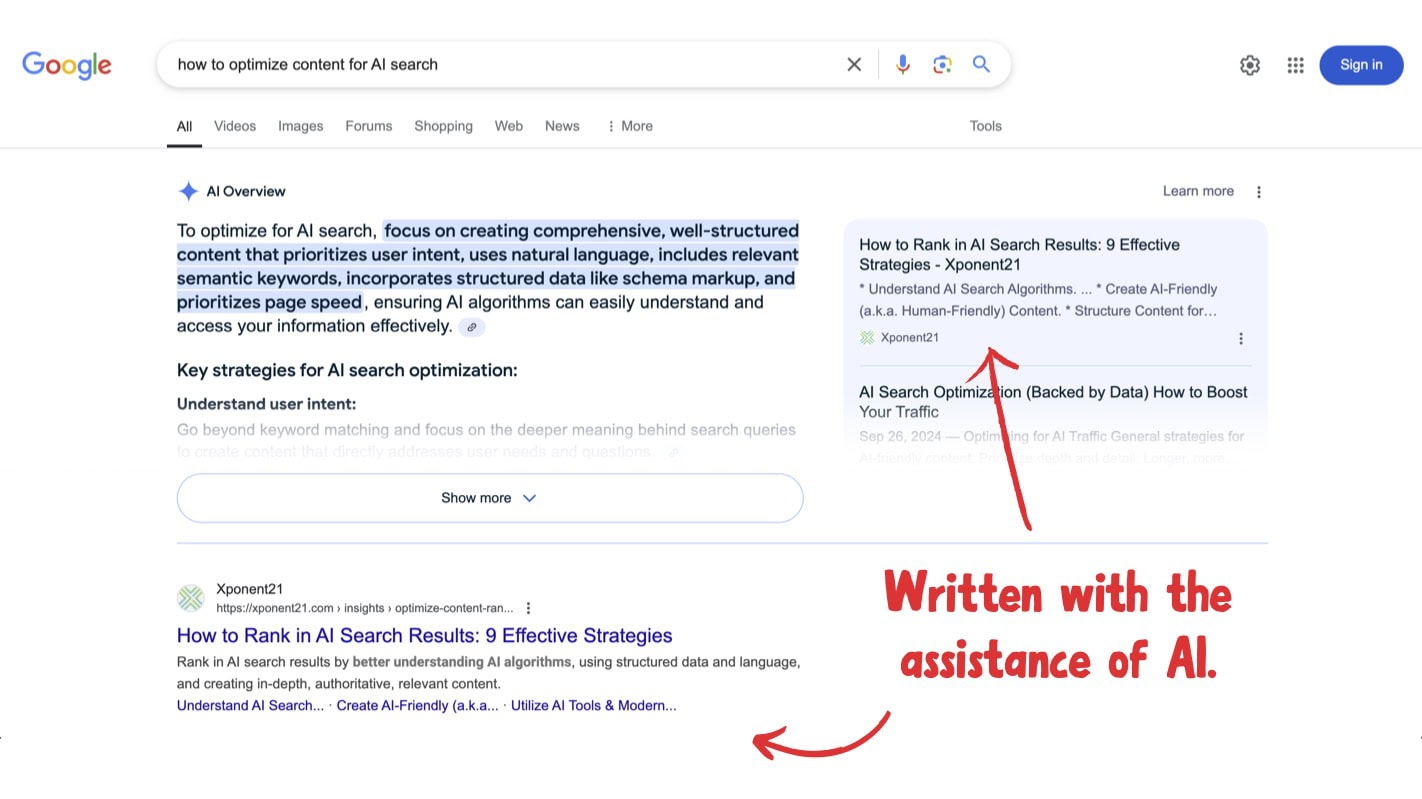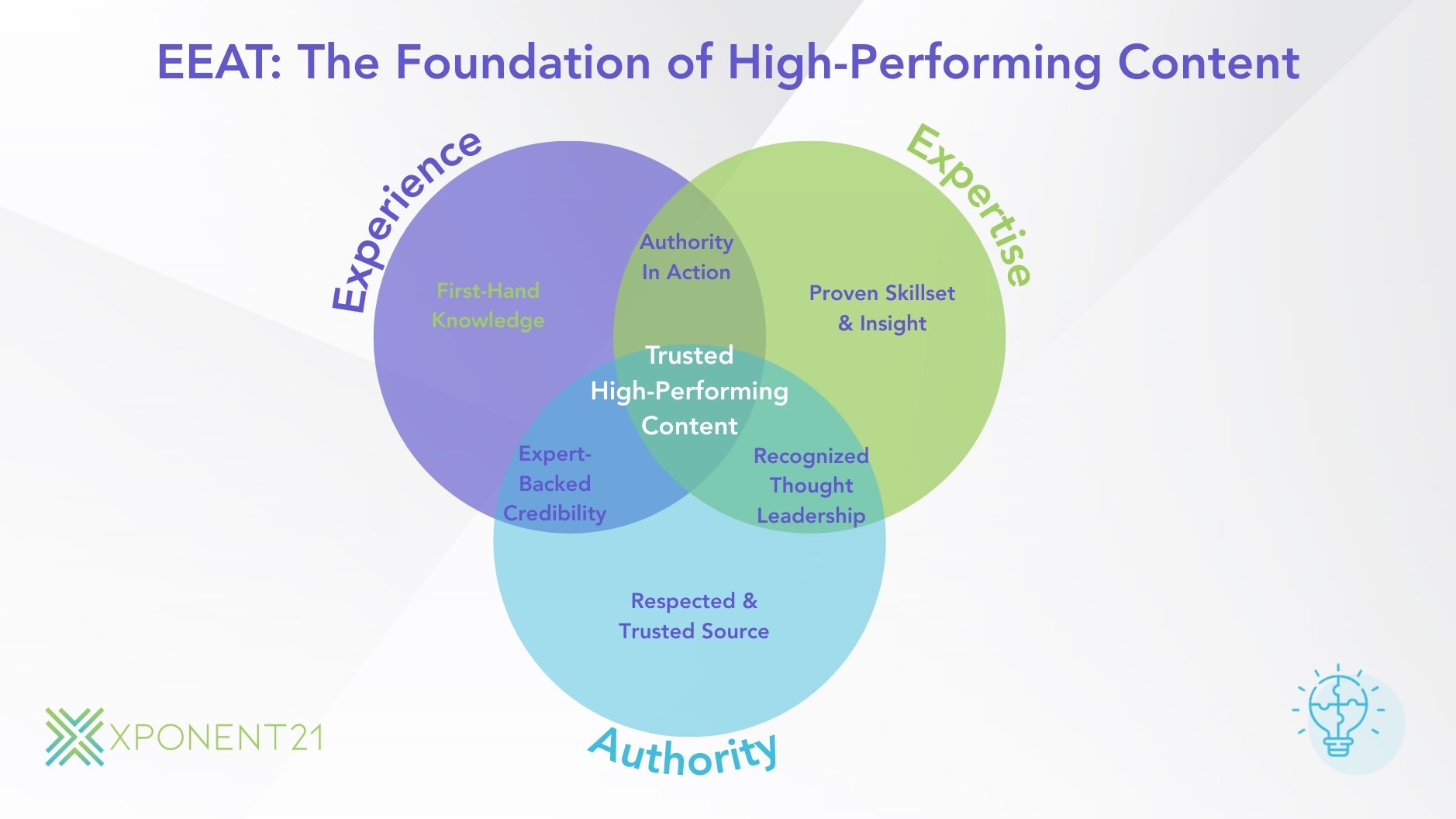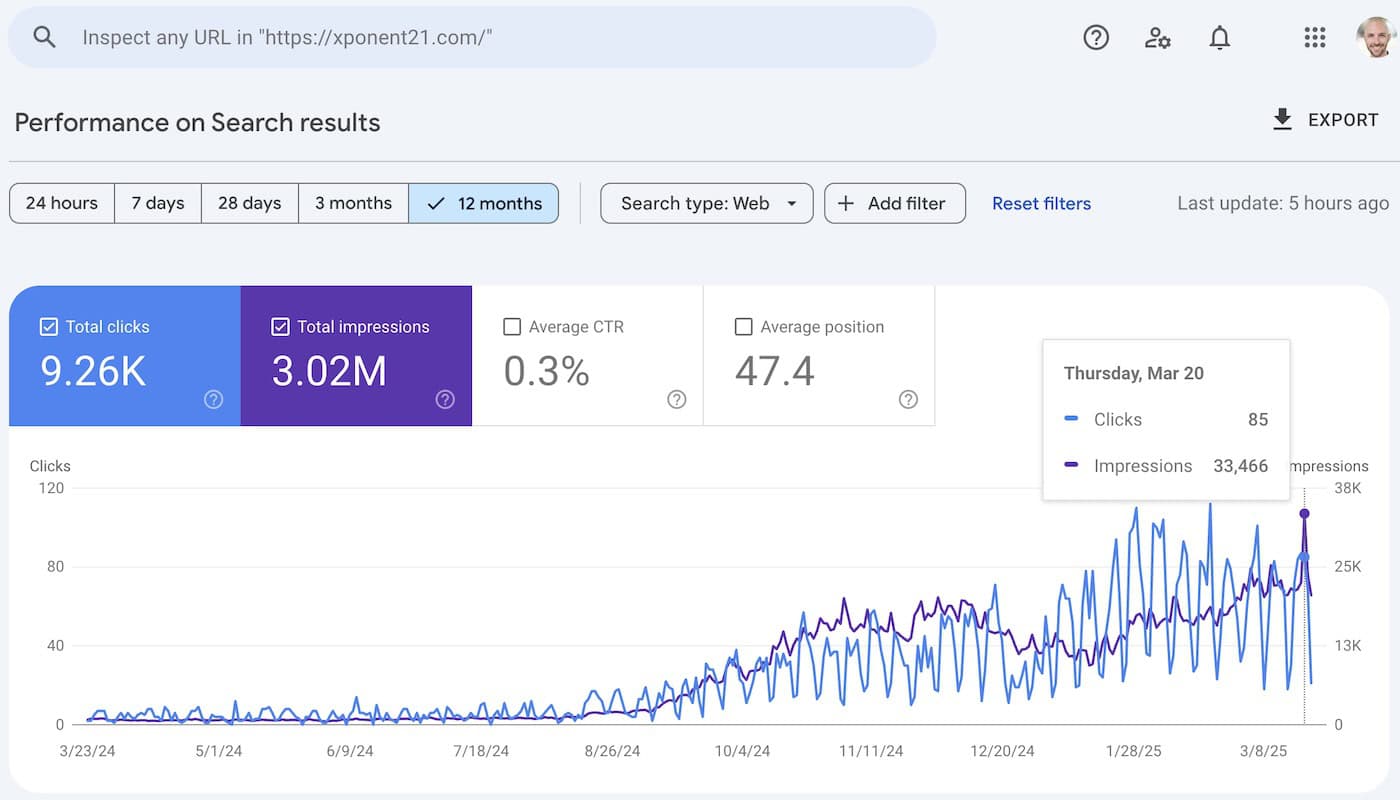
If you’ve heard that “AI-generated content is bad for SEO,” you’re not alone. We’ve had clients come to us worried that using AI to assist with content creation will get their website penalized by Google or cause their search rankings to take a hit. They heard it from “a guy.”
Let’s set the record straight: AI-generated content isn’t the problem. Low-quality content is.
Google isn’t out to punish content written with the help of AI tools like ChatGPT. What search engines do penalize is content that fails to meet their most important standard: helpfulness.
At Xponent21, we use AI to help generate content every day—but we don’t just let the machine spit out an article and hit “publish.” Our success comes from blending human expertise, strategic intent, and AI-assisted efficiency to craft content that not only ranks but actually drives business growth.
This article, written with the assistance of AI, will explain what search engines really want, why lazy AI-generated content fails to rank in search, and how we’ve developed a framework and process to create content that does.
Contents
- The Myth: “AI Content Will Get You Penalized”
- The Real Issue: Low-Quality Content
- What Search Engines Actually Want
- Our Approach: AI as a Tool, Not a Shortcut
- Why This Matters in the Age of AI Search
- The Results: What Happens When You Get It Right
- The Bottom Line: Human + AI Is the Future
- Ready to Future-Proof Your Content?
The Myth: “AI Content Will Get You Penalized”
Let’s start with what’s wrong with this idea.
Many people assume that because AI tools can quickly generate articles, search engines will automatically view this content as low-quality. But that’s not the case.
Here’s what Google actually says:
“Using AI doesn’t violate our guidelines. What matters is the quality of the content, not how it was produced.”
In other words, the method doesn’t matter—outcomes do.
If the content is helpful, authoritative, and satisfies the user’s search intent, it can rank, whether it was written by a human, an AI, or a combination of both.
The Real Issue: Low-Quality Content
The confusion comes from this truth: Most AI-generated content is bad. Why is it bad?
When someone relies on AI to simply churn out surface-level content, the result is often:
- A regurgitation of existing online information
- Thin, vague, or generic content
- A lack of originality or unique insight
- No evidence of human expertise or authority
- Lacks alignment with audience intent
This kind of content doesn’t serve readers—and Google knows it.

Google’s Helpful Content System is designed to reward content that demonstrates Experience, Expertise, Authoritativeness, and Trustworthiness (EEAT). That’s the bar every piece of content must clear, regardless of who—or what—wrote it.
What Search Engines Actually Want
Search engines like Google have one goal: to deliver the best possible answers to users’ questions. Why? Because the happier users are with Google, the more they’ll use it, and that means more ad sales for Google.
When evaluating content, they ask:
- Is it helpful? Does it solve the user’s problem?
- Is it original? Does it offer something new, or just repeat what’s already online?
- Is it expert-led? Was it written or reviewed by someone with proven expertise in the topic?
- Is it authoritative? Does it come from a trusted source?
- Is it clear and comprehensive? Does it thoroughly cover the topic in a way that’s easy to understand?
If your content checks those boxes, it doesn’t matter whether it was drafted by a person or assisted by AI. It will rank because it meets the user’s needs. Here are some comparisons between the quality factors of high- and low-performing content.
| Quality Factor | Low-Quality Content | High-Quality Content |
|---|---|---|
| Audience Focus | Generic, one-size-fits-all | Tailored to a specific audience and search intent |
| Depth | Shallow, surface-level information | Comprehensive, detailed, problem-solving |
| Originality | Regurgitated from other sources | Includes unique insights, data, or examples |
| Expertise | No expert input or validation | Backed by professional experience & bylined authors |
| Authority | Anonymous or lacks credibility | Cited by reputable sources, clear credibility |
| Optimization | No keyword strategy or structure | Strategically optimized for search & AI discovery |
| User Experience | Difficult to read, lacks organization | Easy to read, structured with headings & visuals |
| Performance in Search | Rarely ranks, low engagement | Ranks well, attracts traffic, drives conversions |
| Written With AI Assistance | Driven by lazy prompts and little refinement | Driven by detailed prompts and human-level editing |
Our Approach: AI as a Tool, Not a Shortcut
At Xponent21, we don’t fear AI—we embrace it. But we never let AI replace the human element.
We use AI as a tool to enhance our process, not to cut corners. Here’s the framework we follow to ensure every piece of content we create drives results:
Step 1: Strategy Comes First
Every successful piece of content starts with a plan. Before we write a single word, we answer these questions:
- Who is our audience? What are they trying to accomplish?
- Where are they in their journey? Are they just starting their research, comparing options, or ready to make a decision?
- What problem are they trying to solve? What specific pain point brought them to search for this information?
- What is our unique solution? How can we provide value that others can’t?
This strategic foundation ensures that our content speaks directly to the reader’s needs—and stands out from the competition.
Step 2: We Engineer Content for Humans and Search Engines
Once we know the audience and goal, we craft content designed to excel in both readability and search performance:
- Easy for readers to consume: Clear structure, headings, bullet points, and simple language.
- Deep and thorough: We go beyond surface-level answers, providing examples, step-by-step guidance, and expert perspectives.
- Optimized for search: Structured data, keyword placement, internal linking, and other technical elements ensure search engines and large language models understand and cite our content.
Step 3: We Inject Human Expertise
This is what truly sets great content apart.
AI can aggregate information, but only humans can offer real-world insight, personal experience, and professional judgment.
We ask:
- What do we know that others don’t?
- What patterns have we seen in our work?
- What data, results, or case studies can we share?
Our clients are experts in their fields, and we collaborate with them to highlight their unique knowledge. This makes the content authoritative and signals to search engines that it’s trustworthy.
Step 4: We Establish Authoritativeness
Expertise alone isn’t enough—it needs to be visible:
- Clear authorship: We credit experts with bylines, bios, and credentials.
- Proven online presence: We link to the author’s professional profiles, past work, and speaking engagements.
- Evidence-backed claims: We support our statements with data, citations, and external references when appropriate.
- Fact-based language: We engineer language to appear confident and be read as factual to instill trust.
- Enhanced with video: If you want to amplify your impact, add video to your content to bolster it’s power in search.
This creates what Google loves most: content that readers, and search engines alike, can trust.
Why This Matters in the Age of AI Search
With the rise of AI-powered search results (like Google’s Search Generative Experience), the standards are only getting higher.
AI search systems don’t just pull one answer—they synthesize information from multiple trusted sources. If your content is authoritative, original, and helpful, it’s more likely to be included in these AI-generated responses.
But if your content is thin or generic, it will be ignored.
The Results: What Happens When You Get It Right

When you combine AI efficiency with human strategy and expertise, the results speak for themselves:
- Top search rankings for competitive terms
- Increased website traffic from organic search
- Higher conversions because the content resonates with readers
- Authority positioning within your industry
This is the approach we’ve used to drive success for clients across industries. And it’s how we’ll continue to win as search evolves.
The Bottom Line: Human + AI Is the Future
The best content isn’t written by humans or AI—it’s created by humans working with AI.
At Xponent21, we harness the speed and efficiency of AI while leaning into what humans do best:
- Strategy
- Empathy
- Expertise
- Creativity
- Authority
That’s what it takes to rank today—and drive real business results tomorrow.
Ready to Future-Proof Your Content?
If you’re tired of hearing myths about AI content and want a strategy that actually works, we’d love to help.
Let’s build content that doesn’t just rank—it grows your business.
Contact us to learn more about our SEO-driven content strategies.
Want to read more on this subject? Check out these articles to get to the next level:

